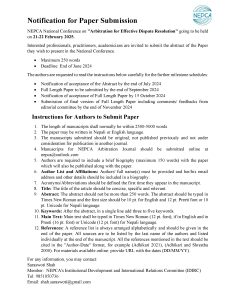Code of Ethics For Arbitrator
Preamble:
The use of arbitration to resolve Commercial Disputes was formalized in Nepal after the enactment of Arbitration Act, 2038 B.S. The act has since been replaced by Arbitration Act, 2055B.S.(1999 AD).Arbitration forms a significant part of justice on which our society relies for a fair determination of legal rights. Persons who act as arbitrators therefore undertake serious responsibilities to the public, as well as to the parties. Arbitrators should be impartial, independent, competent, diligent and discrete. This requires a code of ethics. This code sets forth generally accepted standards of ethical conduct for the guidance of Arbitrators and Parties following NEPCA rules for arbitral proceedings and the Arbitrators appointed by NEPCA.
1. Fundamental Rule
Arbitrators shall proceed diligently and efficiently to provide the parties with a just and effective resolution of their disputes, and shall be and shall remain free from bias.
2. Acceptance of Appointment
2.1 A prospective arbitrator shall accept an appointment only if he is fully satisfied that he is able to discharge his duties without bias.
2.2 A prospective arbitrator shall accept an appointment only if he is fully satisfied that he is competent to determine the issues in dispute, and has an adequate knowledge of the language of the arbitration.
2.3 A prospective arbitrator should accept an appointment only if he is able to give to the arbitration the time and attention which the parties are reasonably entitled to expect.
2.4 It is inappropriate to contact parties in order to solicit appointment as arbitrator.
2.5 A prospective arbitrator should accept an appointment only if he is not disqualified by the prevailing laws.
3. Elements of Bias
3.1 The criteria for assessing questions relating to bias are impartiality and independence. Partiality arises when an arbitrator favours one of the parties, or where he is prejudiced in relation to the subject matter of the dispute. Dependence arises from relationships between an arbitrator and one of the parties, or with someone closely connected with one of the parties.
3.2 Facts which might lead a reasonable person, not knowing the arbitrator’s true state of mind, to consider that he is dependent on a party create an appearance of bias. The same is true if an arbitrator has a material interest in the outcome of the dispute, or if he has already taken a position in relation to it. The appearance of bias is best overcome by full disclosure as described in Article 4 below:
3.3 Any current direct or indirect business relationship between an arbitrator and a party, or with a person who is known to be a potentially important witness, will normally give rise to justifiable doubts as to a prospective arbitrator’s impartiality or independence. He should decline to accept an appointment in such circumstances unless the parties agree in writing that he may proceed.
3.4 Past business relationships will not operate as an absolute bar to acceptance of appointment, unless they are of such magnitude or nature as to be likely to affect a prospective arbitrator’s judgment.
3.5 Continuous and substantial social or professional relationships between a prospective arbitrator and a party, or with a person who is known to be a potentially important witness in the arbitration, will normally give rise to justifiable doubts as to the impartiality or independence of a prospective arbitrator.
4. Duty of Disclosure
4.1 A prospective arbitrator should disclose all facts or circumstances that may give rise to justifiable doubts as to his impartiality or independence. Failure to make such disclosure creates an appearance of bias, and may of itself be a ground for disqualification even though the non-disclosed facts or circumstances would not of themselves justify disqualification.
4.2 A prospective arbitrator should disclose:
a) any past or present business relationship, whether direct or indirect as illustrated in Article 3.3, including prior appointment as arbitrator, with any party to the dispute, or any representative of a party, or any person known to be a potentially important witness in the arbitration. With regard to present relationships, the duty of disclosure applies irrespective of their magnitude, but with regard to past relationships only if they were of more than a trivial nature in relation to the arbitrator’s professional or business affairs. Non-disclosure of an indirect relationship unknown to a prospective arbitrator will not be a ground for disqualification unless it could have been ascertained by making reasonable enquiries;
b) the nature and duration of any substantial social relationships with any party or any person known to be likely to be important witness in the arbitration;
c) the nature of any previous relationship with any fellow arbitrator (including prior joint service as an arbitrator);
d) the extent of any prior knowledge he may have of the dispute;
e) the extent of any commitments which may affect his availability to perform his duties as arbitrator as may be reasonably anticipated.
4.3 The duty of disclosure continues throughout the arbitral proceedings as regards new facts or circumstances.
4.4 Disclosure should be made in writing and communicated to all parties and arbitrators. When an arbitrator has been appointed, any previous disclosure made to the parties should be communicated to the other arbitrators.
5. Communications with Parties
5.1 When approached with a view to appointment, a prospective arbitrator should make sufficient enquiries in order to inform himself whether there may be any justifiable doubts regarding his impartiality or independence; whether he is competent to determine the issues in dispute; and whether he is able to give the arbitration the time and attention required. He may also respond to enquiries from those approaching him, provided that such enquiries are designed to determine his suitability and availability for the appointment and provided that the merits of the case are not discussed.
5.2 In an arbitration in which the two party-appointed arbitrators are expected to appoint the third arbitrator, such third arbitrator shall be approached and appointed by the consent of both the arbitrators. In the event that a prospective sole arbitrator is approached by one party alone, he should ascertain that the other party or parties, has consented to the matter in which he has been approached.
5.3 Throughout the arbitral proceedings, an arbitrator should avoid any unilateral communications regarding the case with any party, or its representatives. If such communication should occur, the arbitrator should inform the other party or parties and arbitrators of its substance.
5.4 If an arbitrator becomes aware that a fellow arbitrator has been in improper communication with a party, he may inform the remaining arbitrators and they should together determine what action should be taken. Normally, the appropriate initial course of action is for the offending arbitrator to be requested to refrain from making any further improper communications with the party. Where the offending arbitrator fails or refuses to refrain from improper communications, the remaining arbitrators may inform the innocent party in order that he may consider what action he should take. An arbitrator may act unilaterally to inform a party of the conduct of another arbitrator I order to allow the said party to consider a challenge of the offending arbitrator only in extreme circumstances, and after communicating his intention to his fellow arbitrators in writing.
5.5 No arbitrator should accept any gift or substantial hospitality, directly or indirectly, from any party to the arbitration. Sole arbitrators and presiding arbitrators should be particularly meticulous in avoiding significant social or professional contacts with any party to the arbitration other than in the presence of the other parties.
6. Fees
Unless the parties agree otherwise or a party defaults, an arbitrator shall make no unilateral arrangements for fees or expenses.
7. Duty of Diligence
All arbitrators should devote such time and attention as the parties may reasonably require having regard to all the circumstances of the case, and shall do their best to conduct the arbitration in such manner that costs do not rise to an unreasonable proportion of the interests at stake.
8. Involvement in Settlement Proposals
An arbitrator should not be present or otherwise participate in settlement discussions or act as mediator. If the parties reach a settlement after the start of arbitration, the arbitral tribunal may record the settlement in the form of award made by consent of the parties, if so requested by the parties.
9. Confidentiality of the Deliberations
The deliberations of the arbitral tribunal, and the contents of the award itself, remain confidential in perpetuity and the arbitrator should not disclose to any one unless legally compelled to do so.


